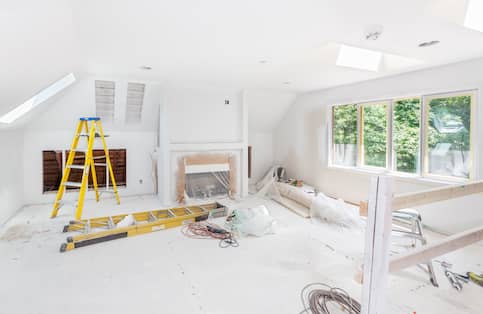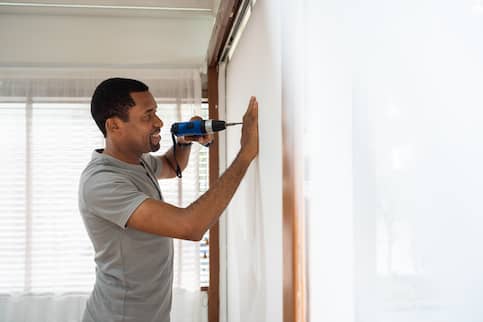If your home doesn’t meet your current needs, consider remodeling instead of buying a new one. A home remodel can enable you to make your house a more livable space.
However, home remodeling costs can be high, so it’s essential to research pricing before you start any work. Our detailed guide will provide answers to the question: How much does a home remodel cost? The costs cited below are averages, according to HomeAdvisor, as of June 2025.
Key Takeaways:
- While costs can vary depending on the project scope, the average cost to remodel a home is $52,241.
- A low-end home remodeling project typically starts at $3,000, but remodeling project costs can quickly reach $190,000 or more for high-end projects.
- Some home remodel and renovation financing solutions to explore include home equity loans, home equity lines of credit (HELOCs), cash-out refinances and home improvement loans.
What Is The Average Cost To Remodel A House?
The average cost to remodel a home is $52,241. However, most projects fall within a range of $19,489 to $88,359. On average, home remodels typically start at around $3,000 for low-end projects and can reach upwards of $190,000 for high-end projects.
Many factors can contribute to the total cost, including home build and size, the quality of materials used and labor costs. Updates to plumbing and electrical systems, as well as changes to the floor plan, can result in significant cost increases.
Some home improvements are considered low end, while others fall into the midrange or high-end categories.
- Low-end home remodels typically include smaller projects and cosmetic work, such as painting, landscaping, and updating flooring, cabinetry and appliances.
- Midrange home remodels caninclude the above options, utilizing some premium materials and appliances and incorporating new light fixtures and hardwood flooring.
- High-end home remodels oftenfeature premium materials, custom cabinets, built-ins, foundation repairs, layout changes, roof replacements, and basement or attic conversions.
See What You Qualify For
Buy A Home
Discover mortgage options that fit your unique financial needs.

Refinance
Refinance your mortgage to have more money for what matters.
Tap Into Equity
Use your home’s equity and unlock cash to achieve your goals.
How Much Does A Home Remodel Cost By Room?
Some homeowners opt to focus on a specific room rather than remodeling their entire home.
Here’s what you can expect to pay to remodel different rooms in your home:
| Room | Average Price Range |
|---|---|
| Bedroom | $1,500 – $5,500 |
| Bathroom | $6,500 – $28,000 |
| Kitchen | $14,500 – $40,500 |
| Basement | $12,000 – $35,000 |
| Garage | $1,500 – $50,000 |
| Attic | $4,500 – $16,500 |
How Much Does A Home Remodel Cost By Square Foot?
You can expect to pay between $15 – $60 per square foot to remodel your house.
Here’s the average cost to remodel a home based on total square footage:
| Square Feet | Average Price Range |
|---|---|
| 750 | $11,250 – $45,000 |
| 1,000 | $15,000 – $60,000 |
| 1,250 | $18,750 – $75,000 |
| 1,500 | $22,500 – $90,000 |
| 1,850 | $27,750 – $111,000 |
| 2,000 | $30,000 – $120,000 |
| 2,500 | $37,500 – $150,000 |
Common Factors Associated With Home Remodel Costs
Here are some expenses associated with a home remodel project, along with their costs:
Labor
Labor costs vary depending on the work involved and the contractor’s level of experience. You may need to hire a general contractor to coordinate the project and hire subcontractors. Labor for a general contractor can make up 40% – 50% of the total project cost.
Here are some average hourly rates by contractor type:
- Electrician: $50 – $100
- Plumber: $45 – $200
- Architect: $125 – $250
- Structural engineer: $70 – $250
- HVAC technician: $5,000 – $12,500 to install a new HVAC system
Materials
Material costs vary depending on the room being updated and whether low- or high-end materials are being used, such as vinyl versus hardwood floors or granite versus laminate countertops.
Permits
If you’re making a structural change or adding an addition to your home, you may need to obtain a permit. Costs range from $500 – $2,500, depending on project scope and complexity. Additionally, you may need to hire an architect and have a property survey conducted.
Taxes
Remodeling can increase the value of your home, which could lead to increased property taxes.
Before starting a remodeling project, consider how a potential increase in property value could result in a bigger property tax bill.
Type Of House
The type of house makes a significant difference in the overall cost of a home remodeling endeavor. For instance, you’ll pay less money to remodel a condo or townhome, but a farmhouse or historical home will likely have higher home remodeling costs.
Location
Where you live can significantly impact your project cost. Expect to pay more if you live in a big city rather than a small town. Material costs can vary depending on your location, but labor has the biggest impact on the final price. Labor costs can fluctuate significantly nationwide.
Looking To Remodel Your Home?
Answer a few simple questions to compare Refinance, Home Equity and Personal Loan offers
Additional Home Remodel Costs To Factor Into Your Budget
Other factors may increase your overall home remodeling costs. Let’s take a closer look:
- Alternate living arrangements: An extensive home renovation can take up to 6 months to complete. If you need to make alternate living arrangements while renovations are being done, that will add to the project cost. Mobile homes and extended-stay hotel costs can run you $2,000 – $10,000 per month.
- The home’s age: Because you may need to update the structure or major systems, renovating an older or historical home will cost more than a newer build. Remodeling costs for an older house can start as high as $100,000. The home’s condition will impact whether costs climb higher.
- Floor plan changes: Altering your home’s floor plan is considered a high-end renovation, which comes with greater costs. You’ll likely need to hire a structural engineer to ensure that the work is done safely. If your project involves removing load-bearing walls, project costs can exceed $10,000.
- Foundation repairs: When remodeling your home, consider how foundation and structural repairs could impact your budget. This type of work typically costs between $2,200 – $7,700 on average, depending on the extent of the repairs. If extensive work is needed, it can cost tens of thousands of dollars or more.
- Mold or asbestos remediation: Mold or asbestos remediation is another expense that can add to renovation costs. Average mold remediation costs $2,230. Meanwhile, the cost of asbestos removal can range from $1,200 – $3,100.
- Unforeseen costs: With every home improvement project, unexpected costs can arise. Plan to allocate an additional 10% – 20% to your total budget to cover these costs.
Not Sure What Loan Product Is Right For You?
Answer a few simple questions to compare Refinance, Home Equity and Personal Loan offers
Estimating Your House Remodel Costs
The best way to estimate your home remodeling costs is to consult with an experienced contractor. A professional can evaluate the scope of your project and factor in information such as home size and preferred materials. You should get quotes from multiple contractors and compare options before hiring someone.
How to Save Money On House Remodeling Costs
Home remodeling projects can be expensive, and the costs of updating even one room can quickly add up. But you can make strategic choices that help to reduce overall costs.
Here are some ways you could save money:
- DIY: DIYing can help you save on home remodeling costs. Even if you can’t DIY the entire project, you could save money by doing basic tasks like replacing doors, painting or surfacing the floors yourself.
- Gather multiple quotes: Ask people you know for contractor recommendations and gather at least three estimates to compare. Never pay for the entire project up front. Instead, come up with a payment schedule you’ll follow as the work is completed.
- Start demolition yourself: If you have proper tools, safely doing some demolition work yourself can be another way to save money.
- Choose budget-friendly materials: Utilizing budget-friendly materials can significantly reduce your expenses when remodeling or building a home.
- Buy floor model appliances: When buying expensive appliances, floor models can offer savings. Floor models are appliances that have been on display at retail stores.
- Maximize your current space: You’ll pay much less if you choose to renovate your current space instead of building on your home. An addition requires changes to your home’s foundation and floor plan, which can be expensive.
- Avoid moving plumbing: Keeping existing plumbing in place can help you save on renovation costs.
- Start small: If you don’t have the budget to do everything you want at once, you can remodel your home in stages. For example, you might start with updating your floors and then move on to your cabinetry once you’re ready.
- Check for federal grants: You may be eligible for a federal grant that can help offset some of your home renovation costs. Requirements and eligibility vary by grant.
Financing A Home Remodel
Don’t let a lack of savings stop you from making home improvements. You may be eligible to finance your home renovation or remodel. Here are some financing options to explore:
- Home equity loan: A home equity loan lets you borrow from the equity you’ve built up in your home. You’ll receive a one-time, lump-sum payment, so this solution can be a good fit if you know how much your entire project will cost.
- Home equity line of credit (HELOC): Like home equity loans, HELOCs let you tap into your home’s equity. Instead of receiving the money up front, you’ll receive a line of credit you can draw from on an as-needed basis. A HELOC is a good choice if you’re unsure of the total project costs.
- Cash-out refinance: A cash-out refinance lets you refinance your home for more than its current value, receiving the difference in cash. But you’ll have to pay closing costs.
- Home improvement loan: You may also be able to apply for a home improvement loan with a bank or online lender. One major benefit to personal loans for home improvement is that you won’t have to use your home as collateral.
House Remodel Cost FAQ
Here are answers to questions you may have about home remodels:
Meanwhile, remodeling projects are intended to alter the structure or function of specific areas of your home. Examples of remodeling projects include finishing a basement or attic, remaking a kitchen or bathroom, adding a bedroom or building a sunroom.
However, two interior home improvement projects made the list: kitchen and bathroom remodels. Improving your home’s curb appeal or investing in remodeling projects, such as a kitchen or bathroom remodel, may help increase the value of your home.
Final Thoughts: Start Small And Expand When Remodeling
Remodeling can be a good option for many homeowners. While home remodeling costs can add up, you can make strategic choices to save money. Before you begin remodeling your home, gather quotes from multiple contractors so you can establish a project timeline and budget that work for you. Finally, financing solutions can help to alleviate financial stress.

Natasha Etzel
Natasha Etzel is a financial writer with over a decade of experience. She has covered various financial topics, including mortgages, personal loans, home equity loans, debt consolidation, and refinancing. She writes for financial companies, including mortgage lenders, and various publications, including NerdWallet, Newsweek, The Motley Fool, and more.












